

By Jeremy Portnoy & Bob Ivry | Published at Real Clear Investigations
Like the weather, everyone complains about Pentagon spending and mismanagement, but no one does anything about it. Leaders of the world’s most expensive military have refused to conduct or failed to complete every internal financial audit since Congress first demanded such accountability in the 1990s. The Department of Defense owns over 70% of the nation’s assets and can’t account for half of them. In fairness, military brass has had plenty of enablers in its failures to tame wild and sometimes blindfolded spending, with a special boost from political leaders who consistently block reform.
Although the Pentagon budget has grown by 50% over the last 10 years, President Trump wants to add another 12% to the Pentagon's budget for fiscal year 2026, a move that for the first time will boost defense spending to over $1 trillion.
That number will almost certainly end up higher because, by law, no matter how generous the president’s request is, the Pentagon is required to ask Congress for even more money. The chief of staff of each military branch must put together an unfunded priority list – nicknamed a “wish list” – requesting money for items not included in the president’s budget.
This has been routine since the 1990s, and the procedure became federal law in 2017. The lists don’t need to include lengthy justifications of why the money is needed, as is the case for most budget requests to Congress.
READ THE FULL STORY.